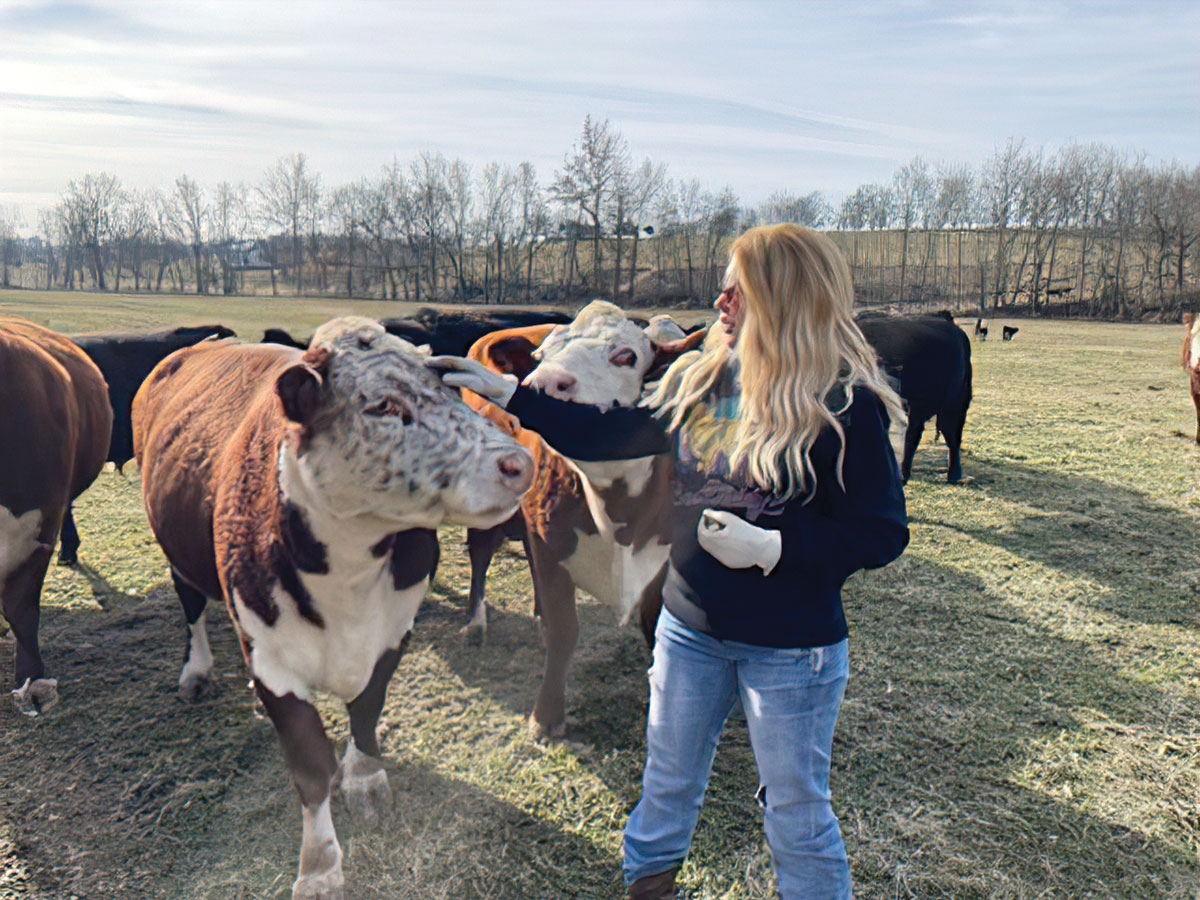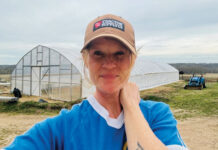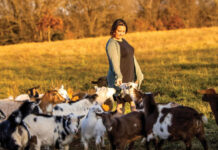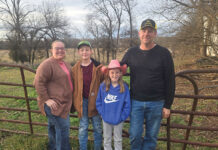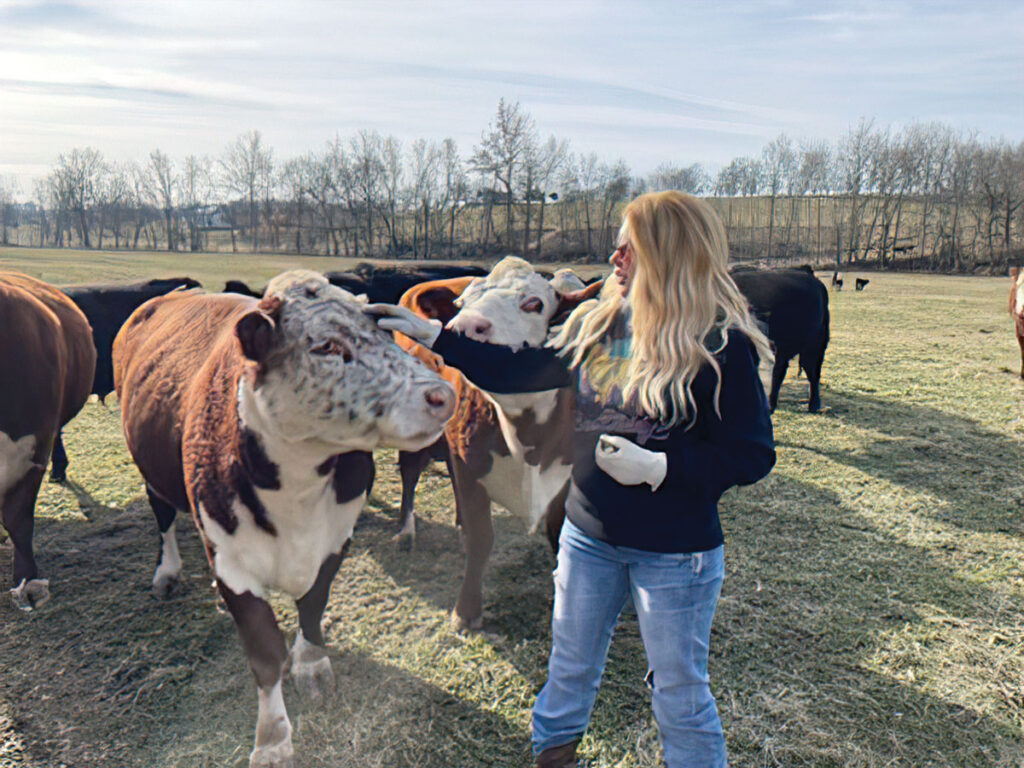
Cow Kiss Ranch follows a low stress approach to beef production
CRANE, MO. – What co-owner/operator Rachael Countryman emphasized about the operation of Cow Kiss Ranch is how they want all of their clients and customers who want good quality meat to know their cattle are raised differently.
She and her partner Daren Pomeroy strive to deliver to customers are beef cattle that have been empathetically raised and well cared for, well fed, and when their time has come, are as dispatched as humanly possible.
Cow Kiss Ranch outside Crane, Mo., operates as the antithesis of a feedlot, which as Rachael noted, is where the majority of consumers’ beef is raised and harvested.
She said traditional feedlot operations are, “mass production, crammed into one area, fed, fed, fed, fed, fed, and not really interacting.”
Rachael noted scientific data supports the principal that how cows are raised and dispatched affects the quality of the meats that are produced.
“All of our cows are free range,” she said.
The Cow Kiss approach to dispatching their animals is to do it on site.
“We don’t trailer our cattle,” Rachael said. “That causes stress, and that stress hormone runs through the meat.”
In their research, added stress negatively affects taste of meat.
The Cow Kiss method is to have the processor come out to the ranch, drive out to the animals in a vehicle with which they are familiar, and dispatch them there in the field.
Cow Kiss Ranch does not sell processed beef. They sell live cattle.
“The consumer gets to come out and pick their product,” Rachael explained. “If they want to come out and feed it, they can.”
If the customer wants to have special instruction, such as having it grain finished, the operators will pull the chosen animals at the proper time and grain finish them. That also enables buyers who can’t afford or perhaps really don’t want to buy a 1,500 pound beef to pick a smaller and therefore more affordable animal.
Cow Kiss also offers a payment program, that spreads the purchase price over time.
Cow Kiss inoculates for blackleg and uses a dewormer, they do not, however, use antibiotics or growth hormones. The necessary topical treatments for lice, worms and flies are applied through a scrubber system that delivers a citronella, cinnamon, garlic and camphor-based mixture.
Rachael said nearly everyone with whom they spoke to as they developed their approach to beef cattle operations emphasized that, generally, cattle that are raised like the ones they produce are “too expensive or you end up having to buy a whole cow or half a cow.”
Through their prior career connections, Rachael and Daren developed a network to “pair up” buyers that provides them the opportunity to split their purchase with others.
Another unique incentive to buy from Cow Kiss Ranch is that they have a “buy back” program. Even after processing, if a client comes to Rachael and Daren to say they can no longer afford or need as much product as they had thought, they will buy the beef back.
Currently, their business comes to them virtually by word of mouth. Rachael has a real estate business and many of her contacts and associates from that part of her life are purchasers of Cow Kiss cattle. Rachael and Daren use social media accounts to alert their contact lists about animals they will have coming available on average as the cattle approach 12 to 18 months old.
When Cow Kiss began operations, five years ago, Rachael and Daren, both had successful careers. Rachael worked in emergency medical services for 12 years, and Daren was installing fiber optic cable for major corporations, and still does. When the couple bought the ranch, it was as a place for their families to gather and thrive in the rural Ozarks atmosphere. They bought their first cattle mostly to help keep the property cleared, but Rachael and Daren soon found out although they did enjoy the cattle operation they did not thrive in the sale barn aspects of cattle ranching. Moreover, the couple figured out that they could profit from doing business differently, and Cow Kiss Ranch evolved.
Rachael said once they changed the process and methods of their operations they discovered the cattle weren’t the only ones under less stress.
“It’s less stressful on us. It’s less stressful on the cows,” and she said, adding they could not only make the same amount of money but also deliver a better product to their community.
The Cow Kiss operators grow their own fescue/orchardgrass hay on a separate 30 acre farm near Marionville, Mo.
In extreme winter weather, cattle are moved to a tree-sheltered valley at the back of their property and given hay and grain twice a day.
“We have very happy cows,” Rachael said with a big grin.
The Cow Kiss Ranch, Rachael said, has already grown exponentially.
Their plans are ultimately to expand their operations closer to the Reeds Spring and Galena area, where Daren grew up.
Their herd is currently mostly comprised of Angus and Herefords that give them the black baldies that dominate their herd. However, the Cow Kiss plans are to not only expand their physical footprint, but they expanded their herd of 40 to 50 momma cows and three bulls with 16 head of Japanese Wagyu females. The cows are expected to begin calving in April.

